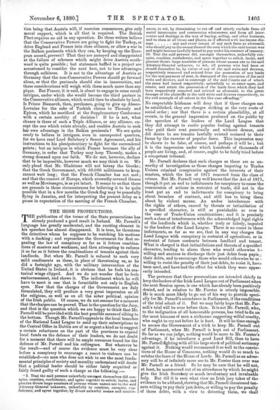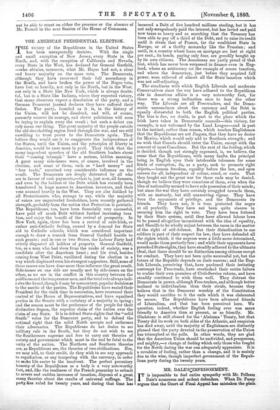THE IRISH PROSECUTIONS.
THE publication of the terms of the State prosecutions has already produced a good result in Ireland. Mr. Parnell's language has greatly moderated, and the exciting element in his speeches has almost disappeared. It is true, he threatens the detectives whom he supposes to be watching his motions with a ducking ; and reproaches the Government for first re- pealing the law of conspiracy so far as it fetters combina- tions of masters and workmen, and then attempting to enforce it so far as it fetters the combinations of tenants against their landlords. But when Mr. Parnell is reduced to such very mild condiments as these, in place of threatening us, as he did a fortnight ago, with the military intervention of the United States in Ireland, it is obvious that he feels his ora- torical wings clipped. And we do not wonder that he feels embarrassment, and shows it. The indictment which he will have to meet is one that is formidable not only in English eyes. Now that the charges of the Government are duly formulated, they will produce a very great impression on all the religious, as well as on all the sober political, opinion of the Irish public. Of course, we do not assume for a moment that the charges can be proved. ;That is the question for the Jury, and that is the question which we are happy to think that Mr. Parnell will be provided with the best possible means of sifting to the bottom. Though Mr. Parnell's appeals to the local branches of the National Land League to send up their subscriptions to the Central Office in Dublin are of so urgent a kind as to suggest a certain reluctance on the part of the provinces to expend local funds on the defence of their leaders, we do not doubt for a moment that there will be ample resources found for the defence of Mr. Parnell and his colleagues. But whatever be the result—and of course the evidence must be very clear before a. conspiracy to encourage a resort to violence can be established—no man who does not wish to see the most funda- mental principles of society and morality undermined will doubt that a political leader should be either fairly acquitted or fairly found guilty of each a charge as the following:— "3. That the said persons unlawfully amongst themselves did con- spire, combine, confederate, and agree together to solicit, incite, and procure divers large numbers of persons whose names are to the said Attorney-General unknown, unlawfully to combine, conspire, con- federate, and agree together, by divers unlawful means and contriv-
ances, to wit, by threatening to cut off and utterly exclude from all social intercourse and commnnion whatsoever, and front all inter- course and dealings in the way of buying, selling, and other business, and to shun at all times and places, as if affected with loathsome dis- ease any and every tenant of any such farm as aforesaid, who should pay to the owner thereof the rent which the said tenant was and might become lawfully bound to pay nnder his contract of tenancy. 10. That the said persons did, amongst themselves, unlawfully con- spire, combine, confederate, and agree together to solicit, incite, and procure divers large numbers of persons whose names are to the said Attorney-General unknown, to wit, all persons who had been or should thereafter be, by virtue of any of the said writs and decrees, respectively removed and evicted from the possession of any lands for the non-payment of rent, in disregard of the execution of the said writs and decrees, and in contempt of the said Courts out of which the same had issued respectively, unlawfully to re-enter upon, and retake, and retain the possession of the lands from which they had been respectively removed and evicted as aforesaid, to the great damage of the plaintiffs in the said writs and decrees respectively, to the evil example of all others in the like case offending."
No respectable Irishman will deny that if these charges can be established, they are charges striking at the very roots of social order ; nor that there is a certain plausibility, at all events, in the general impression produced on the public by the speeches of the leaders of the Land League that they did attempt to excite popular feeling against tenants who paid their rent punctually and without demur, and did desire to see tenants lawfully evicted restored to their farms by the exercise of popular force. This impression may be shown to be false, of course, and perhaps it will be ; but it is the impression under which hundreds of thousands of people are living, and, of course, ought to be fairly tried before a competent tribunal.
Mr. Parnell declares that such charges as these are as un- worthy of investigation as those charges imputing to Trades Unions criminal conspiracies against the interests of their masters, which the law of 1871 removed from the class of crimes. But Mr. Parnell very well knows that the Act of 1871, though it put an end to indictments for conspiracy to cause the commission of actions in restraint of trade, did not in the least put an end to indictments for conspiracy to bring about breaches of contract, and still less to bring them about by violent means. An undue interference with the rights of others, caused by threats or intimidation of a specified character, is still as punishable as ever in the case of Trade-Union combinations ; and it is precisely such a class of interferences with the acknowledged legal rights of the landlords which is, whether truly or falsely, imputed to the leaders of the Land League. There is no count in these indictments, so far as we see, that in any way charges the Land League with conspiracy in restraint of agriculture, or in restraint of future contracts between landlord and tenant. What is charged is that intimidations and threats of a specified character, tending to alarm those who would otherwise b., willing and anxious to discharge their just debts from payin.; their debts, and to encourage those who would otherwise be m - willing to resist the penalty of their just debts, to resist it, have been used, and have had the effect for which they were appar- ently intended.
The pretence that these prosecutions are intended chiefly to keep the leaders of the Irish Land League out of Parliament when the next Session opens, is one which has already been positively denied, and in relation to Mr. Forster is utterly impossible. He is much more likely to go out of his way to provide speci- ally for Mr. Parnell's attendance in Parliament, if the conditions of the trial admit of it. But we may fairly hope that Mr. Par- nell's trial will be over before then. It is not Mr. Parnell, who, to the indignation of all honourable persons, has tried to fix on the most humane of men a nickname suggesting wilful cruelty, who ought to cry out before he is hurt. It will be time enough to accuse the Government of a trick to keep Mr. Parnell out of Parliament, when Mr. Parnell is kept out of Parliament. So far as we can judge, nothing would be more to Mr. Forster's advantage, if he introduces a good Land Bill, than to have Mr. Parnell fighting with all his large stock of political acrimony against it. Nothing would recommend it so well to the convic- tions of the House of Commons, nothing would do so much to subdue the fears of the House of Lords. Mr. Parnell as an adver- sary will be of infinitely more use to Mr. Forster than ever was Mr. Parnell as a friend. So he may be sure that he will not, at least, be manoeuvred out of an attendance by which he might give the Irish Secretary so much involuntary and invaluable help. But till it is seen what view an Irish jury takes of the evidence to be adduced, showing that Mr. Parnell threatened ten- ants willing to pay their just debts, or willing to pay the penalty of those debts, with a view to deterring them, we shall not be able to count on either the presence or the absence of Mr. Parnell in the next Session of the House of Commons.



































 Previous page
Previous page